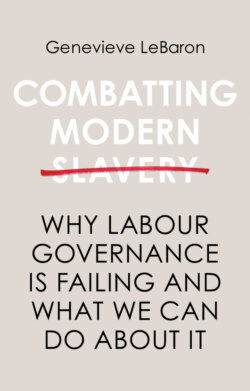Combatting Modern Slavery

Реклама. ООО «ЛитРес», ИНН: 7719571260.
Оглавление
Genevieve LeBaron. Combatting Modern Slavery
Contents
Guide
Pages
Combatting Modern Slavery. Why Labour Governance Is Failing and What We Can Do About It
Copyright page
Acknowledgements
1 Who Does Labour Governance Work For?
What is Labour Governance?
What is Modern Slavery?
Why Global Labour Governance Is Failing
This Book’s Approach
Corporations as Cause and Solution to Labour Abuse
Corporations Save the World’s Workers
This Book’s Arguments and Structure
Labour exploitation in global supply chains
Corporate power and the state
The recruitment industry
The enforcement industry
Corporate Fairytales vs. Worker Power
Notes
2 Labour Exploitation in Global Supply Chains
What Is Forced Labour?
The Business Demand for Forced Labour
Outsourcing
Irresponsible Sourcing Practices
A Supply of Vulnerable Workers
Designed to Fail
The Global Business of Forced Labour
Notes
3 Corporate Power and the State
The Contemporary MNC
Corporate growth and the new monopolies
The financialization of the firm
Structural constraints on labour costs
Corporations and the State
States as the architects of corporations’ growing power
Corporate antislavery activism
CSR as a political weapon
The Politics of Corporate Efforts to Combat Modern Slavery
Notes
4 The Recruitment Industry
A Market for Recruitment
Supply-side factors
Demand-side factors
Mobility regimes and government regulation of the recruitment industry
Here come the corporates
The Rise of Ethical Recruitment Initiatives
What are ethical recruitment initiatives and why aren’t they working?
Lack of enforcement and accountability
Failure to tackle root causes
Sidelining workers
Monitoring Unethical Recruitment
Notes
5 The Enforcement Industry
The Problems with Social Auditing
The rise of big audit firms
Long and complex enforcement supply chains
Secrecy and a lack of transparency
Liability of social auditors
Ineffectiveness of social auditing
Widespread awareness of audit shortcomings
The Problems with Ethical Certification
Certifying exploitation
Why doesn’t ethical certification eradicate forced labour?
Misleading Consumers, Undermining Public Governance
Notes
6 Protecting Twenty-First-Century Workers
Trading in Fairytales for Real Change
How to Fix Labour Governance: Paths Forward
Addressing the Business Demand for Forced Labour
Transform business models and redistribute value
Enforce existing laws
Strengthen due diligence
Regulate supply chains
Regulate the enforcement industry
Worker-driven social responsibility
Rebalance corporate and worker power
Addressing the Supply of Vulnerable Workers
Living wages and social protection
Expand unions and organizing
Strengthen protections for low-wage and migrant work
Regulate the recruitment industry
Conclusion
Notes
Index
POLITY END USER LICENSE AGREEMENT
Отрывок из книги
Genevieve LeBaron
My colleagues and friends at the Sheffield Political Economy Research Institute (SPERI), especially fellow members of our Corporations Reading Group, have made writing this book exciting and a less lonely task than it would have been otherwise. They helped me to sharpen ideas and tackle parts of the global economy that I wouldn’t otherwise have been bold enough to write about. Thanks especially to Andrew Gamble, Colin Hay, Andreas Rühmkorf, Michael Jacobs, Scott Lavery, Jon Gamu, Liam Stanley, Andrew Hindmoor, Tony Payne, Owen Parker, Natalie Langford, Ellie Gore, Remi Edwards, Ed Pemberton, Patrick Kaczmarczyk and Charline Sempéré. I feel lucky to have such wonderful colleagues who reciprocate my enthusiasm for researching labour and corporations.
.....
In sharp contrast to the era in which Nike’s reliance on child labour was first exposed, corporate actors today play a central role in global labour governance. As already mentioned, multinational corporations (MNCs) like Nike, Apple and Nestlé have enacted a vast array of voluntary initiatives to detect, address and prevent labour exploitation in their supply chains. Companies at the helm of global supply chains include within their codes of conduct specific requirements for suppliers concerning labour standards and use elaborate indexes to score suppliers on labour practices and noncompliance. They develop CSR initiatives, such as Mondelēz International’s Cocoa Life programme. And they write about these in their annual sustainability reports and modern slavery statements, which are produced to comply with recent legislation to spur greater transparency over global supply chains.
In an effort to prevent the embarrassment of incidents like Nike’s child labour scandal, companies now monitor labour standards in global supply chains using social auditors. Most companies hire third party (but typically still for-profit) auditors to monitor working conditions in portions of their supply chains, usually focusing on Tier 1 suppliers. Nike notes in its 2018 Statement on Forced Labor, Human Trafficking and Modern Slavery that it conducted 471 audits and assessments in fiscal year 2018.34 Some companies push the cost of auditing onto suppliers, requiring them to hire auditors and submit results. As Coca-Cola describes it, ‘all of the bottling operations and authorized suppliers selling more than $60,000 annually to the Coca-Cola system are required to complete a third-party audit and share the audit results with The Coca-Cola Company’.35 Many companies also monitor working conditions by providing hotlines for workers to report abuse and by administering mobile phone surveys to workers – measures they describe at sustainability conferences and in their CSR reports as ‘technology-supported worker engagement’.
.....